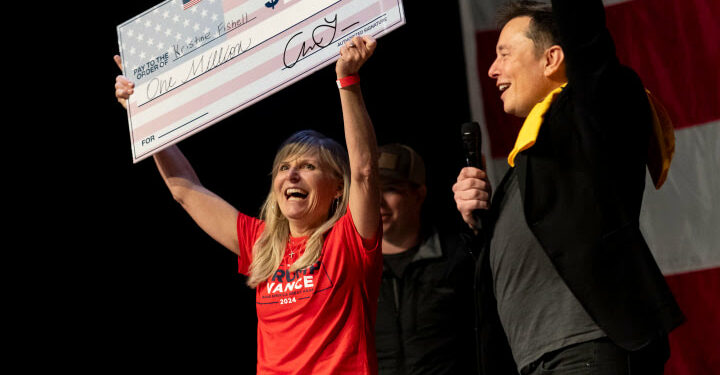A letter sent to Elon Musk’s political action committee by the United States Department of Justice has raised concerns that his daily $1 million giveaway to a registered voter may be in violation of federal law, according to reports from U.S. media.
Musk, the world’s richest man, has thrown his support behind Republican candidate Donald Trump in the 2024 presidential race, where Trump faces off against Democratic Vice President Kamala Harris.
Musk, who owns both Tesla and X/Twitter, initiated the controversial giveaway over the weekend, offering cash prizes to American voters who signed a petition as part of the contest.
The exact date when the DOJ’s letter was sent to Musk’s political organization, America PAC, remains unclear, and investigators from the DOJ have so far declined to comment on the matter.
Multiple U.S. outlets, including CBS News and the BBC’s U.S. partner, reported on Wednesday that the letter warned Musk’s team that the lottery-style sweepstakes might breach federal election laws.
The letter reportedly originated from the DOJ’s Public Integrity Section, following an outcry from Democrats who criticized the cash giveaway as a dangerous stunt.
The legality of the giveaway has sparked debate, with polls still showing a tight race between Harris and Trump.
Under U.S. law, paying people to register to vote is illegal. However, it remains uncertain whether Musk’s initiative violates this provision, as the legal boundaries of the sweepstakes are still being examined.
In a campaign stop in Pennsylvania on Saturday, Musk outlined the contest, which offers substantial sums of money to those who sign a petition circulated by America PAC.
“We want to try to get over a million, maybe 2 million voters in the battleground states to sign the petition in support of the First and Second Amendment,” Musk told the crowd.
The petition aims to gather support for key constitutional rights, including freedom of speech and the right to bear arms.
The rules of the contest state that participants must be registered voters, though they are not required to be affiliated with any particular political party.
“We are going to be awarding $1 million randomly to people who have signed the petition, every day, from now until the election,” Musk announced, framing the giveaway as a nonpartisan effort.
The America PAC website indicates that the contest is open to voters in seven critical swing states; Pennsylvania, Georgia, Nevada, Arizona, Michigan, Wisconsin, and North Carolina.
With U.S. Election Day scheduled for November 5, Musk’s involvement in Trump’s campaign is already drawing significant scrutiny.
While Musk’s endorsement of Trump has made headlines, the underlying question remains, What does Musk seek to gain from this high-profile intervention in the election? As of yet, his broader motives remain speculative.
Meanwhile, legal challenges have mounted. On Tuesday, a group of Republican ex-prosecutors sent their own letter to the DOJ, urging a thorough investigation into the legality of Musk’s giveaway.
“We are aware of nothing like this in modern political history,” they wrote, expressing concerns about potential violations of both federal and state laws.
They acknowledged the general reluctance of law enforcement to act on election-related issues so close to voting day but argued that the seriousness of the allegations made an exception necessary.
Musk has dismissed these claims, insisting the contest is legal and nonpartisan. “You can be from any or no political party, and you don’t even have to vote,” he said in response to concerns.
In response to mounting legal scrutiny, Musk’s contest has shifted slightly.
Reports indicated that the rules were recently revised to frame the cash prizes as a job payment rather than a giveaway.
America PAC’s updated language now states that winners will be “selected to earn $1M as a spokesperson for America PAC,” with recipients being asked to record pro-Trump videos.
Several legal experts have voiced their opinion on the matter, with some suggesting that the contest likely crosses legal boundaries.
Paul Schiff Berman, a law professor at George Washington University, told the BBC that Musk’s offer appears to be in violation of election law.
“His offer is only open to registered voters, so I think his offer runs afoul of this provision,” Berman said, pointing to the U.S. Code on electoral law, which prohibits offering payment in exchange for voter registration.
Adav Noti, from the nonpartisan Campaign Legal Center, added that the sweepstakes “violates federal law and is subject to civil or criminal enforcement by the Department of Justice.”
He reiterated that offering money based on voter registration status is clearly against the law.
However, Jeremy Paul, a law professor at Northeastern University, argued that Musk may have found a legal gray area.
While there is an argument that the scheme could be illegal, he noted that it is “targeted and designed to get around what’s supposed to be the law,” making it a challenging case for prosecutors to prove in court.













